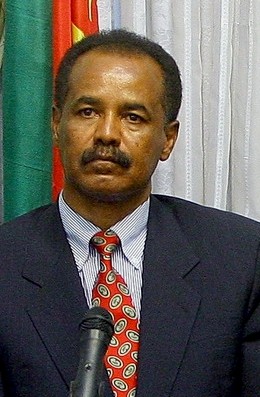Eritrea desperate to undo UN sanctions
 afrol News, 23 April - Eritrea President Isaias Afewerki is on a diplomatic offensive to make the UN lift sanctions against the country last year for training and supplying Somali and Yemenite rebels. Holy cows are being slaughtered in Asmara.
afrol News, 23 April - Eritrea President Isaias Afewerki is on a diplomatic offensive to make the UN lift sanctions against the country last year for training and supplying Somali and Yemenite rebels. Holy cows are being slaughtered in Asmara. In a surprise move, President Afewerki invited foreign journalists to the country, letting them inspect and photograph military installations so far kept a national secret. Even a Swedish journalist jailed in Eritrea for eight years may finally get his trial.
Dubai-based 'Gulf News' - not noted for its criticism of governments, but at least widely available in English language - landed a minor unexpected scoop when being invited to Eritrea by President Afewerki. During the last week, 'Gulf News' have toured the otherwise closed country, even meeting the President himself, and have reported in the expected positive way from Eritrea.
The greatest surprise was the admittance of 'Gulf News' journalists and photographers into Eritrean military posts. The Dubai media could report that it had not observed any foreigners at the camps, which corresponded to sites described in a UN report alleging Somali Islamists were being trained there.
The journalists were even brought to the remote camp at the Djibouti border, allowed to take pictures in certain angles. Earlier, Eritrean authorities had denied UN inspectors access to the same military camp. "No foreigners," 'Gulf News' reporters again could confirm.
As the guided tour went on, journalists were given a chance to interview President Afewerki in the port town of Massawa. While downplaying the UN sanctions as a result of "American anger" against Eritrea, Mr Afewerki made sure to tell journalists reports about deepening Iran-Eritrea ties were untrue. Iran was not to build an oil refinery in Eritrea, he emphasised.
Another sign that Eritrea is eager to improve its international reputation is the surprise announcement that Swedish-Eritrean journalist Dawit Isaak soon is to have a trial after having been detained for over eight years. Girma Asmerom Tesfay, Eritrea's ambassador in Belgium, made this promise to a Swedish MP.
The case of Mr Isaak has soured relations between Sweden and the European Union on one side and Eritrea on the other side for years. A solution in the case could provide the Afewerki regime much goodwill in Europe, needed for a possible lifting of the UN sanctions.
Also neighbouring countries are noting that Eritrea is changing its attitude towards the UN sanctions. Djibouti's Foreign Minister Mahmoud Ali Youssouf at a press conference in Nairobi said he was seeing signs that Eritrea was starting to abide by UN demands to stop its interference in Somalia. Eritrea's foreign policies were bound to be altered, Mr Youssouf said.
Somalia's transitional government, an ally of Eritrea arch-rival Ethiopia, is noting that Eritrean support for the al-Shabaab Islamists is declining. The latest UN report on Somalia supports this observation, concluding that Eritrean weapons deliveries to al-Shabaab had declined but that the Islamists still received financial support from the Afewerki regime.
The UN imposed arms and travel sanctions on Eritrea in December last year for supporting the Islamist insurgent's attempt to topple the transitional government of Somalia. A UN report had found Eritrea was training al-Shabaab insurgents and providing them with arms.
The UN sanctions include travel bans and the freezing of assets of Eritrea's main political and military leaders.
According to the Djiboutian Foreign Minister, Eritrea was now aiming at getting these sanctions lifted as soon as possible. But Eritrea under President Afewerki would not change its foreign policies enough to stop being the region's pariah nation, Minister Youssouf forecasted.
By staff writer
© afrol News


![[AIM] Asmarino Independent Media](/images/logo/ailogo.png)